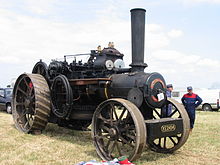|
John Fowler & Co.
53°47′11″N 1°32′16″W / 53.7864905°N 1.5378145°W       John Fowler & Co Engineers of Leathley Road, Hunslet, Leeds, West Yorkshire, England produced traction engines and ploughing implements and equipment, as well as railway equipment. Fowler also produced the Track Marshall tractor which was a tracked version of the Field Marshall. British Railways Engineering Department locomotives ED1 to ED7 were built by Fowler HistoryJohn Fowler was an agricultural engineer and inventor who was born in Wiltshire in 1826. He worked on the mechanisation of agriculture and was based in Leeds. He is credited with the invention of steam-driven ploughing engines. He died 4 December 1864, following a hunting accident. After his death, John Fowler & Co., was then continued by Robert Fowler and Robert Eddison. In 1886 the limited company of John Fowler & Co., (Leeds) Ltd., was formed. It merged with Marshall, Sons & Co., Ltd., of Gainsborough in 1947 to form Marshall-Fowler Ltd. Although not well known for them, Fowler also built a small number (117 has been claimed)[clarification needed] of steam wagons. These were vertical-boilered, with an unusual single-crank cross-compound vee-twin engine. They featured a gearbox (but no clutch) to provide a low drive ratio for climbing steep hills with heavy loads.[1] At least one was preserved, as part of the Tom Varley collection. Production of ploughing engines ceased in 1935.[2] The last Fowler steam driven vehicle was a steam roller produced in 1937.[3] The main products produced by Fowler during the 1930s were their range of tracked tractors, the FD2, FD3 and FD4, powered by Fowler-Sanders diesel engines of 2, 3, and 4 cylinders. They also produced the Fowler Gyrotiller from 1927 - this was a large tracked vehicle 34 foot long and 10 ft 6in wide powered initially by a 225 hp Ricardo petrol engine, later by a 170 hp MAN diesel. It was claimed it could convert virgin territory to seed-bed in one pass and at a rate of an acre per hour.[4] Later versions of the gyrotiller were produced as attachments to the standard Fowler diesel crawler range with Fowler-Sanders engines of 30, 40 and 80 hp. A total of 88 gyrotillers were produced.[5] During the Second World War, the Hunslet factory also produced Matilda, Cromwell, and Centaur tanks for the Army. Track castings were made at a Ministry of Supply factory built in 1943 at Sprotbrough, and after the war Fowler acquired this highly mechanised foundry. In 1947 Fowler came under the ownership of Marshall, Sons & Co. (themselves owned by Thomas W. Ward Ltd). The two companies produced agricultural tractors with Fowler focussing on the tracked versions, and Marshall on the wheeled versions. Although Fowler operated as a subsidiary of Marshall until at least 1966 the companies were eventually merged and the exhibits at the 1970 Smithfield show (three new Track Marshall tractors) are attributed to Marshall-Fowler Limited, John Fowler Works, Leeds.[6] Production at the Hunslet factory finally ceased in early 1974, by which time production of both tracked and wheeled tractors had been moved to the Marshall works at Gainsborough.[7] PreservationAround 700 Fowler engines have survived into preservation.[3] Railway locomotivesSome locations of preserved Fowler railway locomotives include:
Traction engines
References
External linksWikimedia Commons has media related to John Fowler & Co (Leeds).
|
||||||||||||||||||||
